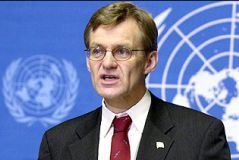Uganda northern conflict is the worst form of terrorism: UN
April 1, 2006 (PATONGO, Uganda) — UN humanitarian relief coordinator Jan Egeland described the situation in Uganda’s war-torn northern region as the worst form of terrorism and called for action to reverse the humanitarian suffering.
 “Conditions here are totally unacceptable. It has to change because people have to live a better life and have a better future,” Egeland said as he visited camps in Patongo in Pader district, some 400 kilometers (about 250 miles) north of the capital Kampala.
“Conditions here are totally unacceptable. It has to change because people have to live a better life and have a better future,” Egeland said as he visited camps in Patongo in Pader district, some 400 kilometers (about 250 miles) north of the capital Kampala.
Egeland said there was a need to provide security for the 40,000 refugees at the Patongo camps so that they could live as they did before conflict erupted in 1986, which has thus far displaced some two million people.
“This is the worst type of terrorism,” Egeland said. “It is unacceptable, intolerable and has to change.”
However, he noted that there was renewed hope that the situation in northern Uganda was getting the necessary attention both locally and from the international community.
“There is now a hope that we did not have before because there is now attention in Uganda, in the region and in the world to change the situation,” he said.
For the past 20 years, northern Uganda has been a battle ground between government forces and Lord’s Resistance Army, who have terrorised civilians and are blamed for forcing millions of people out of their homes in addition to abducting children for combat and as sex slaves.
This week, humanitarian groups said the rate of violent deaths resulting from the conflict in northern Uganda is three times higher than in Iraq since the 2003 US-led invasion to topple Saddam Hussein.
Some 146 people die every week in northern Uganda, which represents 0.17 deaths per 10,000 people compared with 0.052 per 10,000 in Iraq, said a report prepared by 50 aid groups including Oxfam International, Care International, Norwegian Refugee Council, and Save the Children.
“Everybody has to do more, the government of Uganda has to do more. We are emphasizing that the army has to provide real security for the people not only when they are inside camps but also when they go out of these camps,” he said.
On Friday, Egeland held talks with President Yoweri Museveni and discussed the possible appointment of a UN special envoy to northern Uganda as well as a peace mission there, according to a statement issued after their meeting.
The talks also delved into a possible UN role in the country’s national reconciliation and the demilitarization of the police and justice systems in the northern region.
But Egeland said that Museveni favoured a regional representative rather than an envoy to the north, arguing that the problem had become regional.
The UN official, who is on a four-nation, nine-day tour of conflict- and drought-ravaged east Africa, will also visit Sudan, Chad and Kenya.
(ST/AFP)
